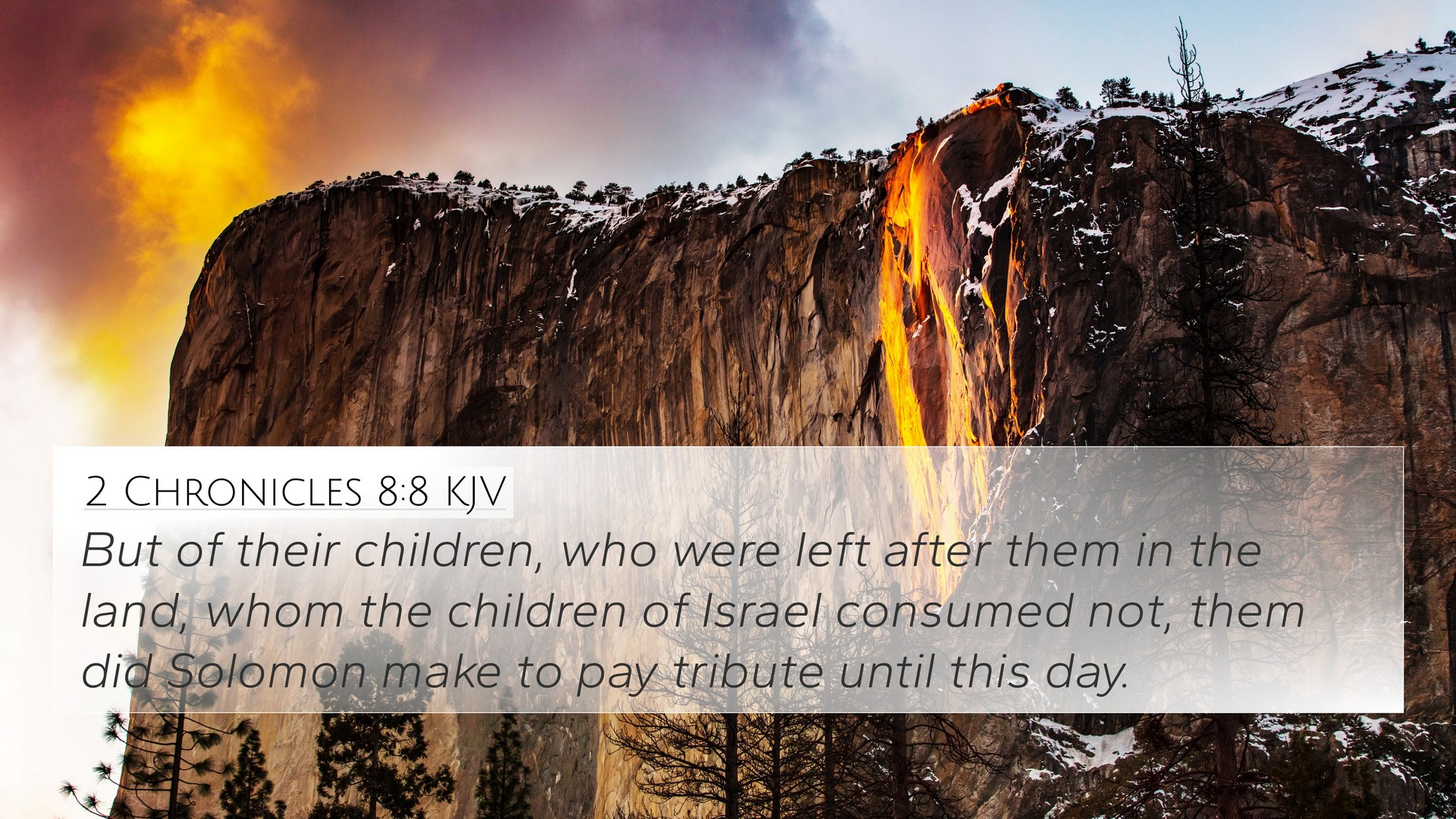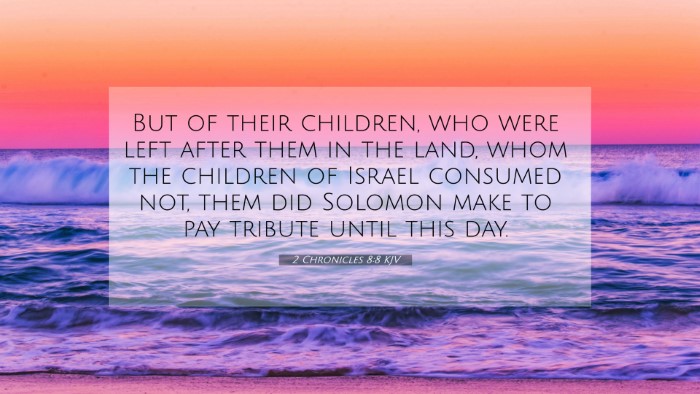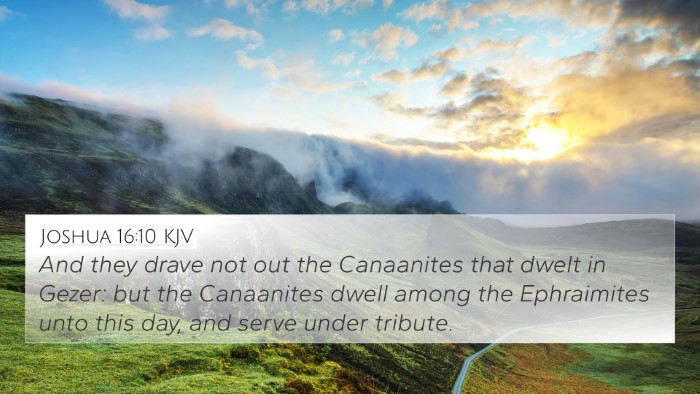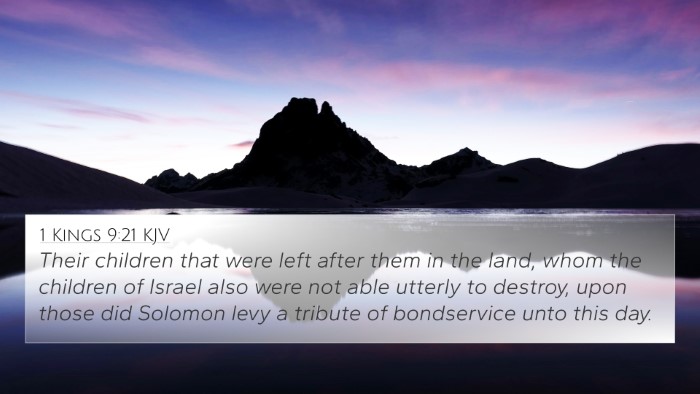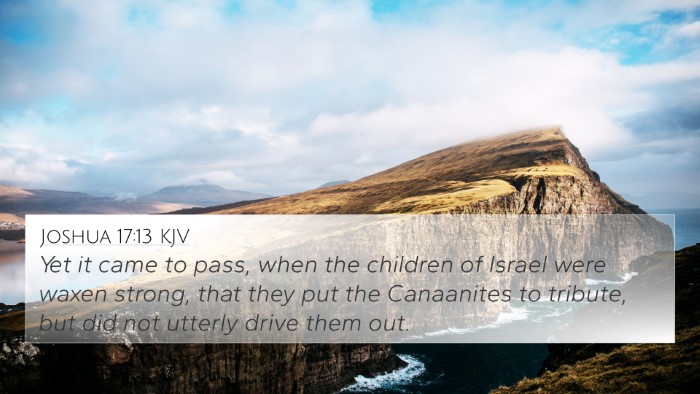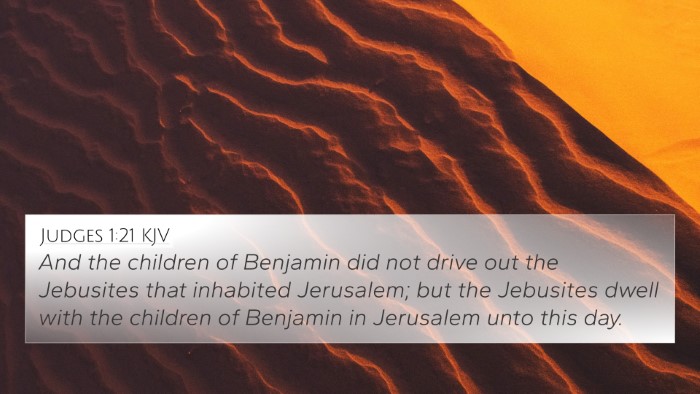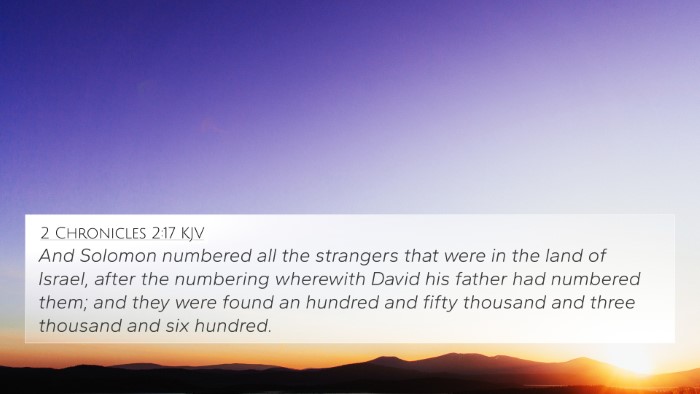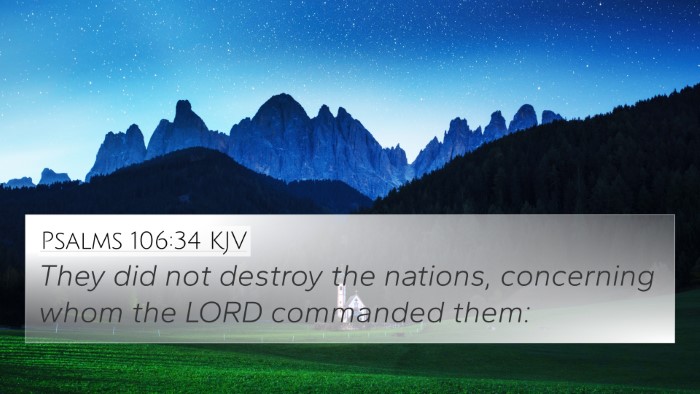Understanding 2 Chronicles 8:8
Bible Verse: 2 Chronicles 8:8
In this passage, we find Solomon discussing the people he appointed for the labor of the temple construction. The verse reads:
"But of their children, who were left after them in the land, whom the children of Israel did not consume; did Solomon make to be taskmasters unto this day." (2 Chronicles 8:8, KJV)
Summary of Insights
This verse highlights Solomon's organization and administrative strategies concerning the workforce in Israel. It reflects on how he dealt with the remnants of the Canaanite population—specifically, he imposed labor upon them for his building projects, including the temple.
Commentary Insights
Matthew Henry's Commentary
Matthew Henry points out that Solomon's reliance on non-Israelites for labor showcases his pragmatism in statecraft. These individuals were left in the land due to Israel's earlier conquests and were not displaced. Solomon wisely utilized their skills and labor without compromising the national integrity of Israel.
Albert Barnes' Commentary
Albert Barnes emphasizes the strategic aspect of Solomon’s leadership. He distinguished between the Israelites and the remaining Canaanites, choosing to continue utilizing the latter for labor. This decision reflects wisdom in governance and resource management, allowing Solomon to maintain a peaceable and productive society.
Adam Clarke's Commentary
Adam Clarke elaborates on the concept of taskmasters, indicating that Solomon indeed had to enforce hard labor upon these individuals. Though their service was essential for constructing monumental edifices such as the temple, it also signals the ambiguous ethical stance Solomon took by extracting labor from the vanquished remnants.
Connections to Other Bible Verses
This verse serves as a nexus to several important Biblical themes and connections. It illustrates not only Solomon's administrative legacy but also themes of servitude, nation-building, and strategic governance. Here are some related Bible verses that share thematic or contextual links:
- 1 Kings 5:13-14: Discusses Solomon's workforce for building the temple, offering insights into his labor management.
- Joshua 9:23: Refers to the Gibeonites, highlighting the origins of forced labor for the Israelites, paralleling Solomon’s practices.
- Exodus 1:11: A historical reference to forced labor in Egypt, providing a comparative lens on oppression and servitude.
- 2 Chronicles 2:17-18: Solomon’s recruitment of workers from Israel and foreigners in the land, necessary for completing temple constructions.
- Deuteronomy 20:10-11: Contains instructions on treaties and dealings with conquered people, relevant to Solomon's decisions.
- 2 Chronicles 5:1: The completion of the temple, giving context to why these labor forces were significant in construction.
- 1 Kings 9:20-21: Discusses the nations that were left behind and their fate under Solomon’s rule, similar to the themes in 2 Chronicles 8:8.
Implications and Themes
Overall, 2 Chronicles 8:8 imparts several key implications:
- Governance and Leadership: Solomon employed a blend of wisdom and strategy in managing his administration, making decisions based on practicality.
- The Ethics of Rule: The use of forced labor from conquered peoples raises complex questions about justice and morality in leadership.
- Legacy of the Temple: The construction of the temple symbolizes more than worship; it signifies the socio-political landscape Solomon navigated.
- Cultivation of Society: The dynamics within Israelite society, particularly concerning labor and ethnicity, significantly shaped Israel's socio-economic fabric.
This Verse in a Broader Context
When considering the overarching narrative of the Bible, 2 Chronicles 8:8 can be linked with themes of covenant, blessing, and the pursuit of peace. It reminds us of how God’s people, while acting under divine guidance, must also navigate the complexities of human relationships and societal structures.
Using Cross-References for Deeper Understanding
For those interested in digging deeper, tools for Bible cross-referencing can be instrumental. Here are some resources and methods to enhance your study:
- Utilize a Bible Concordance to find verses related to specific terms and themes.
- Explore a Bible Cross-Reference Guide, which can offer insights into connecting verses across both the Old and New Testaments.
- Engage in Cross-Reference Bible Study sessions, examining how different portions of Scripture relate to each other thematically.
- Implement Bible Chain References for tracing significant doctrines or narratives throughout Biblical texts.
Conclusion
2 Chronicles 8:8 serves as a vital piece revealing Solomon's wisdom and strategic thinking, exploring complex themes of governance, labor, and the use of resources. Through careful examination of related Scriptures, a richer understanding emerges, enhancing our grasp of Biblical narratives and their interconnectedness.
